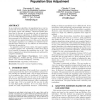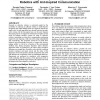335 search results - page 66 / 67 » Learning Simulation Control in General Game-Playing Agents |
101
click to vote
GECCO
2006
Springer
15 years 4 months ago
2006
Springer
In an evolutionary algorithm, the population has a very important role as its size has direct implications regarding solution quality, speed, and reliability. Theoretical studies ...
106
click to vote
GECCO
2005
Springer
15 years 6 months ago
2005
Springer
Research in collective robotics is motivated mainly by the possibility of achieving an efficient solution to multi-objective navigation tasks when multiple robots are employed, in...
127
click to vote
ATAL
2007
Springer
15 years 7 months ago
2007
Springer
Activity recognition is a key component for creating intelligent, multi-agent systems. Intrinsically, activity recognition is a temporal classification problem. In this paper, we...
104
click to vote
GECCO
2008
Springer
15 years 2 months ago
2008
Springer
In this paper we present a swarm grammar system that makes use of bio-inspired mechanisms of reproduction, communication and construction in order to build three-dimensional struc...
113
click to vote
GECCO
2009
Springer
15 years 5 months ago
2009
Springer
HyperNEAT, a generative encoding for evolving artificial neural networks (ANNs), has the unique and powerful ability to exploit the geometry of a problem (e.g., symmetries) by enc...


